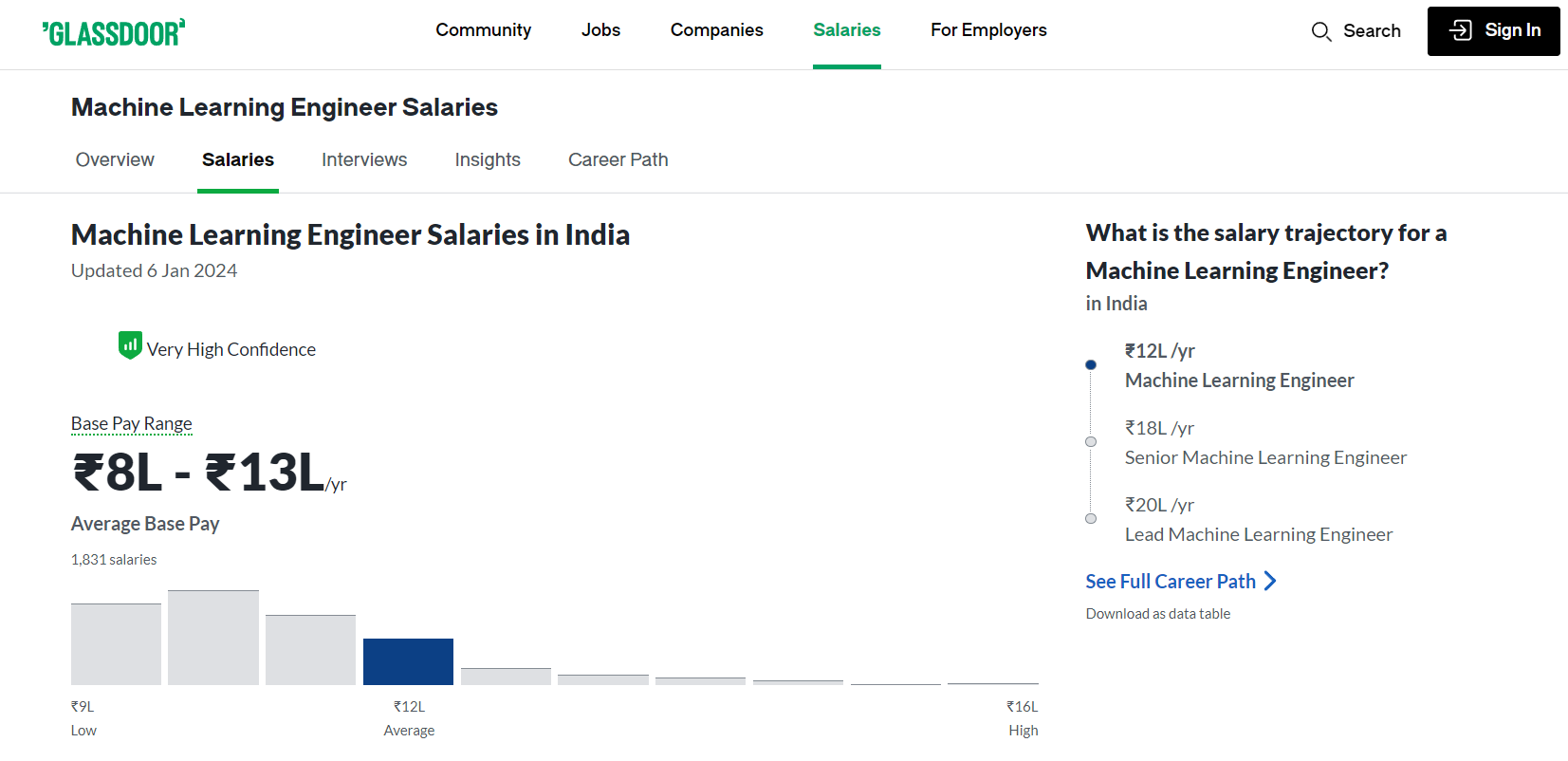Master
Data Science Courses
India’s Only Data Science Training Program created to help you to build a successful career in Data Science from scratch.
Complete Roadmap of Machine Learning for 2024
Have you ever been amazed by how Google Home and Amazon Alexa assist in finding information when asked over voice? Or have you ever wondered how e-commerce companies send you personalized emails for shopping suggestions based on the products you bought online recently? Well, it’s all because of machine learning that these virtual assistants and product recommendations work swiftly. In this article, we will discuss machine learning roadmaps for 2024.
We will give you the step-by-step process that you need to follow to build a successful career in machine learning. So let’s start
What is Machine Learning?
Machine learning is a subset of artificial intelligence that uses data, algorithms, and statistical techniques to build intelligent systems. These systems learn by themselves and improve with experience. The goal of machine learning is to create computer models that can imitate human behavior. Machine learning has found its usage in almost every business sector. From self-driving cars, medical imaging and diagnostics, speech recognition, and facial recognition to online fraud detection, all of these are possible because of machine learning. In recent years, AI and ML technologies have made several breakthroughs, and the rising demand for AI applications across different industries has led to the significant growth of machine learning.
Roadmap and Critical Skills Required for Machine Learning
As for markets and markets.com, the machine learning market is expected to grow to $9 billion by 2022 at a CAGR of 44 percent. Another report from verifiedmarketresearch.com suggests that the machine learning market was valued at $2.4 billion in 2019 and is projected to reach $47.29 million by 2027, growing at a CAGR of 44.9% from 2020 to 2027. Keeping these facts and forecasts in mind, let’s look at the roadmap and critical skills required to build a career in machine learning.
First and foremost is Programming Skills.
For a machine learning engineer, programming languages form the building blocks to develop complex machine learning models. You need to learn at least one programming language, preferably Python or R. You should be familiar with various computer science concepts such as data structures including stacks, queues, trees, and graphs, algorithms for searching and sorting, dynamic and greedy programming, space and time complexity, etc. You also need to know libraries like NumPy, Pandas, Matplotlib, Seaborn, Dplur, Tidia, and ggplot for data analysis and visualization.
The second skill you need to Possess is Applied Mathematics
While solving business problems using machine learning, you have to use machine learning algorithms. To understand the mechanisms behind the algorithms, you need to have a good knowledge of mathematical concepts, such as linear algebra, calculus, statistics, and probability. So, mathematics and machine learning are not just processing the numbers, but understanding what is happening, why it’s happening, and how to obtain the best results.
The third skill to become a Machine Learning expert is Data wrangling and SQL.
Data analysts and machine learning specialists often work with raw data collected from various sources that are not fit for analysis. It has been observed that 80% of data analysis spend too much time on data wrangling. So machine learning experts must clean structure and enrich raw data into the desired format and make it ready for analysis using data wrangling techniques. SQL is another crucial set that you should carry. Machine learning tasks involve using data stored in the form of tables that are present inside relational databases. A good understanding of SQL commands enables you to store, manipulate, retrieve, and handle structured data.
The fourth skill set is Machine Learning Algorithms.
It’s incredibly essential to grasp all the standard machine learning algorithms. Implementing any machine learning techniques requires choosing the suitable model, determining the correct learning method, and an in-depth understanding of hyperparameter tuning. So you should be good with different supervised, unsupervised, and reinforcement learning algorithms such as linear regression, logistic regression, SVM, KNN, decision trees, K-means clustering, etc.
Now coming to the final scale, we have Data Modeling and Evaluation.
The objective of a machine learning engineer is to train the best performing model possible. Depending on the problem at hand, you will need to choose a suitable error measure and an evaluation strategy for a machine learning model.
The most vulnerable part of a machine learning candidates resume is the absence of experience working on diverse machine learning projects. With all the essential skills acquired, you can now build an impressive machine learning portfolio, highlighting some exciting machine learning projects. Machine learning engineers need a portfolio that showcases their expertise to implement machine learning techniques to real-world problems.
With your resume ready, you can now look for the best machine learning jobs in top product companies and startups. You can become a machine learning engineer, a data scientist, a data analyst or a research scientist. Some of the top companies hiring for machine learning roles are Google, Amazon, IBM, Uber, Graminer, Nvidia and LinkedIn.
Salary of a Machine Learning Engineer.
Machine learning engineers are some of the highest-paid professionals in the world. According to Glassdoor.com, the national average salary for machine learning engineers in the United States is 1,31,000 US dollars per year. In India, you can earn nearly 8 lakh rupees per annum. This salary may vary based on your experience, the industry you are applying for, and the company policy. There are immense opportunities in machine learning for sectors such as e-commerce, manufacturing, logistics, retail, and healthcare.
Conclusion:
If you are interested in a career in machine learning, then start your journey now with Digiperform’s Master Certification Program in AI and machine learning. You will learn all the in-demand machine learning skills and work on programming with hands-on examples. The program also offers 100% job assistance.
To learn more about the learning part tools covered and projects that you’ll be working on, You can click on the data science course page link below.
FAQs:
What is machine learning?
Machine learning is a subset of artificial intelligence that enables computers to learn patterns from data and make predictions or decisions without being explicitly programmed.
How does supervised learning work?
In supervised learning, the algorithm is trained on a labeled dataset, where input data is paired with corresponding output labels. The model learns to map input to output, making predictions on new, unseen data.
What is the difference between classification and regression in machine learning?
Classification is used for tasks with discrete output labels (e.g., spam or not spam), while regression is used for tasks with continuous output values (e.g., predicting house prices).
What is overfitting in machine learning?
Overfitting occurs when a model learns the training data too well, capturing noise and irrelevant patterns. This can lead to poor performance on new, unseen data.
What is a neural network in machine learning?
A neural network is a computational model inspired by the human brain, consisting of interconnected nodes (neurons) organized into layers. It is commonly used for tasks such as image recognition and natural language processing.












